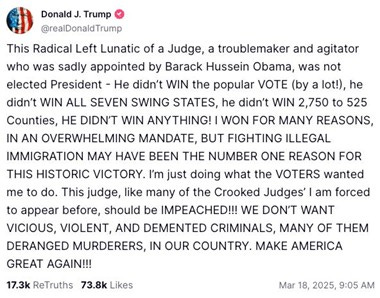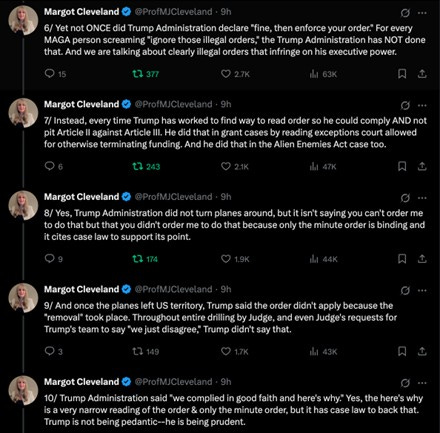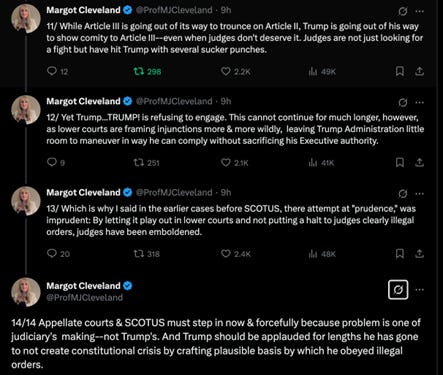Trump v. Roberts
The Trump administration has been trying to follow the law, even though the courts have not. The Chief Justice has been playing a dangerous game by allowing it to happen. This will not last.
(Note: My policy study titled Federal Budget Deficits and the Iron Law of Federal Revenue has been published today. Read it here and let me and our readers know what you think by commenting here and in Substack Notes.)
The Justice Department’s (DOJ) actions in the Tren de Aragua expulsion case displayed a much better-prepared and slicker Trump administration than the 2017-2021 version. Just as the flurry of executive orders and other White House actions thus far showed much greater planning and discipline than the first Trump administration, so did the response to Judge James Boasberg’s comically bombastic frustration at the Trump administration’s refusal to turn jets around in midair while they were reportedly outside of U.S. airspace.
The Trump DOJ reversed the roles that had arisen during Trump’s earlier tenure in the White House. In his first term, Trump continually blustered in anger while crafty leftist lawyers and congressional committees kept the administration tangled in knots for three years and then the deep state sprang a global disease scare to trick him into setting the nation on a course of lockdowns which were followed inevitably by blatantly unconstitutional changes to election processes, a sharp and intense economic depression (which ended just as quickly, though too late to do the president any good politically), corporate censorship of vital news, a manufactured crime wave and plague of street riots, property destruction, thefts, and land takeovers, and all the rest.
Not this time, the Trump team appears to have decided. The Tren de Aragua court battle, though still frustrating to Trump supporters, showed the president’s team taking a lesson from their opponents. For every move the plaintiffs and judge made, the DOJ lawyers had a ready response that pushed the case in another, unexpected direction. This time, the surprises were coming from the president’s side instead of being inflicted on him and his team—starting with the use of an eighteenth century law, still on the books, as the foundation for their case.
When on March 15 at 6:45 p.m. Boasberg quite predictably issued a verbal order in court stating that “any plane containing these folks that is going to take off or is in the air needs to be returned to the United States” and followed up with a written order at 7:25 p.m. to that effect, the DOJ attorneys argued that Boasberg’s order missed the boat and there was just nothin’ they could do. Two of the flights had left Texas an hour or more earlier, doggone it. If only they had known!
One minute after Boasberg issued his written order, the DOJ filed a notice of appeal. Two days later, everybody was back in court, with Boasberg calling a hearing to decide whether the Trump administration violated his order. The DOJ attorneys calmly informed the judge that they did nothing wrong, as Racket News reports in their excellent timeline of the controversy:
Monday, March 17
The Justice Department files a motion to vacate a hearing before Boasberg scheduled for 5 p.m. “and de-escalate the grave incursions on Executive Branch authority that have already arisen.”
The motion argues that Boasberg’s order didn’t take effect until it was in writing on March 15:
… the written minute order governed. It enjoined the government from “removing” the foreign terrorists ‘“pursuant to the Proclamation.” The government did not violate that injunction. As Plaintiffs themselves say, the two flights that they identified departed from the United States before 7:25 PM EDT (and, for that matter, before any oral directives).
Playing the role of the angry neighbor who just knows those darn neighbor kids broke his window with their baseball but ran away before he could catch them, Boasberg reminds the Justice Department attorneys that they were aware the matter was under dispute when they sent the plans off toward El Salvador, where the alleged gang members are now in prison:
You knew in the morning [of March 15] that there would be a hearing at 5 p.m., so any plane that you put into the air in or around that time you knew that I was having a hearing about. So when I said directly to turn those planes around, the idea that my written order was pithier, that this could be disregarded, that's a heck of a stretch.
Boasberg says, in effect, “You darn kids aren’t gonna get away with this!!”
Ah, but then those slippery DOJ rapscallions sneak out the back door when Boasberg goes into the living room to call the police on his old-fashioned, box-shaped, dial telephone hanging on the wall in there:
The Justice Department files a letter with the D.C. Circuit court of Appeals that says “this Court should have a chance to rule upon the Government’s request for a stay pending appeal before the district court tries to compel the Government to disclose sensitive national security information and expose itself to potential judicial micromanagement of how it conducts foreign policy and national security operations.
At every point in this process, Trump’s DOJ team has taken its cue from what the leftist lawfare warriors have been doing since even before Trump first entered the White House as president in 2017: using every angle and every possible conceit or devious trick they can think of, springing a new surprise whenever the opponents think they’ve finally got them trapped.
Trump’s legal team are not yet nearly as good (meaning, devious) as they will have to be, given the opposition of so many irresponsible and arrogant lower-court judges, the left’s formidable army of unscrupulous lawyers, and the lying mainstream press. In addition, the U.S. Supreme Court has fostered this lawfare madness by failing to do its constitutionally mandated job of managing the lower federal courts.
This came to a head on Tuesday when Trump called for Boasberg’s impeachment, writing on Truth Social:
Chief Justice John Roberts stepped in, as was inevitable. Playing the role of the beleaguered local cop just trying to make peace between the comical lunatics quarreling before him, Roberts issued a statement noting that it is the Supreme Court’s job to keep the lower courts in line and arguing that the Executive and Legislative branches should stay out of it and pipe down with that hothead impeachment talk: “For more than two centuries, it has been established that impeachment is not an appropriate response to disagreement concerning a judicial decision,” Roberts said in a statement. “The normal appellate review process exists for that purpose.”
Trump went out of his way to avoid a public dispute with Roberts, though in fact it is the Roberts court that has fecklessly allowed this lawfare problem to fester and develop gangrene. Trump replied to the Chief Justice’s criticism by pointing out that Roberts had not mentioned him by name, though it is obvious that the chief justice was referring directly to the president.
Speaking to Laura Ingraham on Fox News Channel, Trump went on to say that he has never defied a court order and would continue to obey court decisions. That is, in fact, what his current administration has been doing all along.
While promising his adherence to the law and citing past obedience, Trump flipped the script and noted that what many of these judges are doing is highly dubious, using temporary restraining orders to evade rapid appellate reversals over their lack of jurisdiction on the matters being brought before them by shady leftist lawyers who obviously know better:
“However, we have bad judges. We have very bad judges. These are judges that shouldn’t be allowed. I think at a certain point, you have to look at, ‘What do you do when you have a rogue judge?’”
Glenn Harlan Reynolds of Instapundit notes that impeachment will not work for several reasons, above all because it generally backfires politically, which Trump absolutely must avoid. There are, however, plenty of other options. Reynolds and multiple other writers on the political right have made highly informed suggestions for strategies the Trump administration can take in trying to rein in rogue judges.
Reynolds favors several “lower profile but more effective” courses of action. He starts with a couple of major court reforms that could be packaged easily as prudent and nonpartisan:
First, expand the courts. No, no, not “court packing,” nothing like that. The National Judicial Council just recommended adding 66 District Judges and two Court of Appeals judges to remedy the “crisis of undermanned federal courts.” Republicans should do at least that, though I would add at least two new Court of Appeals judges to each circuit. And I might increase the number of district judges appointed to the District for the District of Columbia, and perhaps the Southern District of New York, beyond the Council’s recommendations on the ground that those districts seem to be getting busier.
This wouldn’t be court-packing, since it’s simply following the recommendations of a non-partisan commission. (And in truth, it’s been widely agreed for many years that the federal courts are understaffed).
Now for the Supreme Court. Again, no partisan court-packing. Instead, in a spirit of bipartisanship, the GOP should enact the Democrats’ bill from 2021, which would have expanded the Supreme Court from 9 to 13. Although perhaps, in a spirit of generosity, they might increase the number to 15.
Okay, this is good clean fun, and letting it be known that these changes are on the table would probably be an inducement to better behavior—and in particular an inducement to the Supreme Court to begin supervising lower courts more vigorously. And you could do this with simple majorities of the House and Senate.
Congress could also, with a simple majority vote, “bring back the requirement for three-judge district courts when the legality of federal statutes is challenged, and expand that requirement to include challenges to executive orders,” Reynolds advises.
Following up on a suggestion by Gov. Ron DeSantis of Florida, Reynolds notes that simple congressional majorities could also pass a law to limit the authority of the lower federal courts to run the Executive Branch as they have been doing with the Supreme Court’s action by omission:
[S]trip federal courts of jurisdiction to issue Temporary Restraining Orders and Preliminary Injunctions in the class of cases that we’ve been seeing. Or, indeed, to strip them of jurisdiction to hear any complaints regarding the internal administration of the Executive. Or stripping courts of jurisdiction to issue any order in such cases until an appeals bond has actually been posted by the moving party.
Congress could also provide that lawsuits challenging changes to federal programs or agencies be assigned to randomly-selected district courts from around the nation, rather than the District for the District of Columbia. (It could possibly even go further and simply abolish the District for the District of Columbia, and do this with all cases.
In addition, requiring federal court proceedings to be televised and getting rid of court clerks would shine a light on these judges and force them to write shorter, clearer decisions, Reynolds notes.
Those are all excellent ideas, and I endorse them in full. Even so, it is inexcusable that the Supreme Court has allowed this massive abuse of the law to develop, and especially the way that it has intensified in recent years. Roberts has a lot of damn nerve issuing criticisms of the president after all the abuse the nation’s courts have put Trump and the American people through during Roberts’ tenure as chief justice. If Roberts had done his job, we would not be in this mess.
Reynolds cites an X thread by Notre Dame Adjunct Instructor Margo Cleveland noting that after two months in which the “Trump Administration has faced an avalanche of unconstitutional court orders from single federal judges” (which she cites in the first few items in the thread), Trump has been exceedingly patient with the courts:
As Cleveland notes, it can be argued that Trump has been more respectful of the law and the Constitution than Chief Justice Roberts and the U.S. Supreme Court. If the Court does not step in and do its job, do the justices really expect everybody to accept that?
I do not.







Thank you!
Excellent (hilarious) essay.